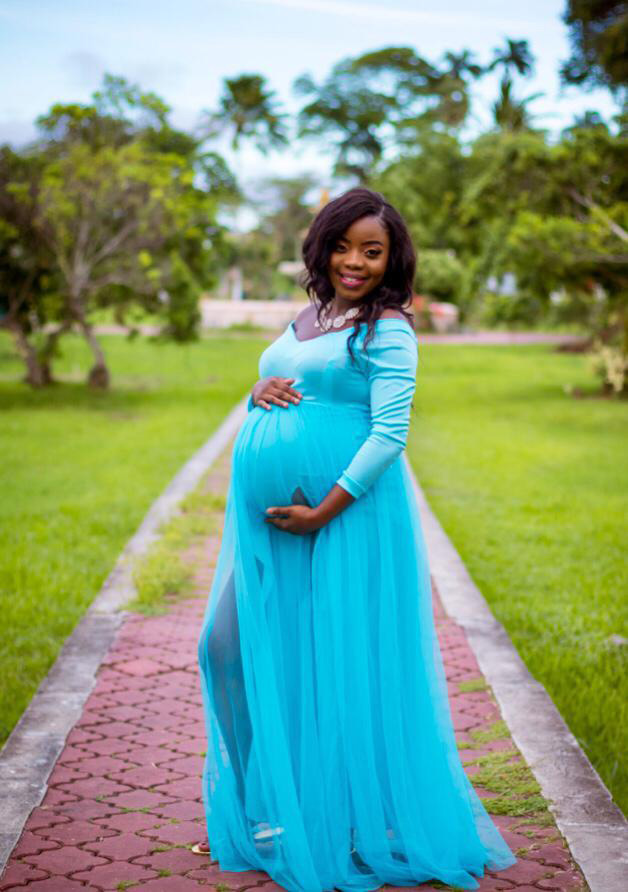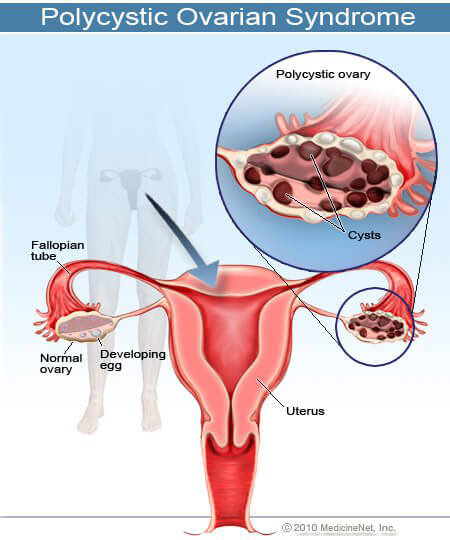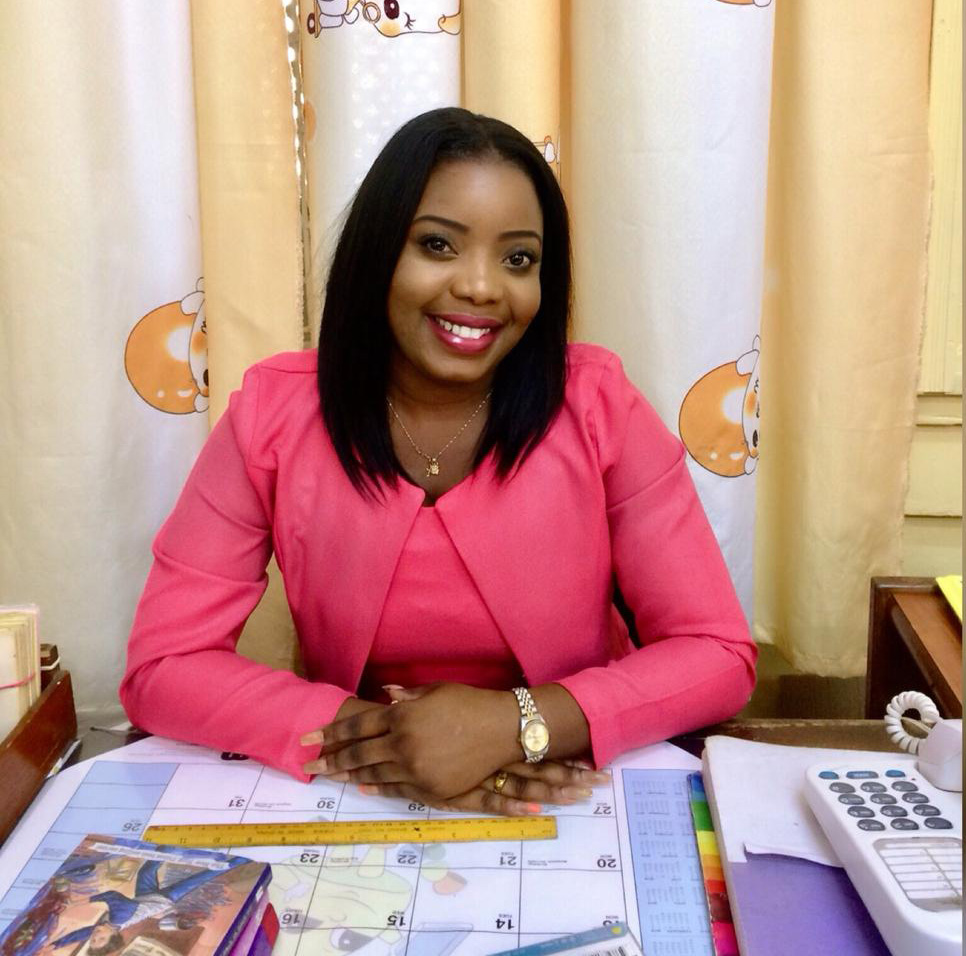At the age of 22, Abigail Brower was diagnosed with Polycystic Ovary Syndrome (PCOS), a hormonal disorder which is common among women of child bearing age.
“During that period of time, you dealing with constant pain, cramps and it was even giving off an odour and so these are things that mess with your self-esteem as a young person. So you are battling with just one simple thing, hormone imbalance, that leads to all these other ailments as a young person,” Brower, a librarian, told Sunday Stabroek in a recent interview, while noting that she also feared that she couldn’t get pregnant.
Brower, 30, who recently gave birth to a son, now is seeking to raise awareness about PCOS, in hopes of empowering and encouraging other women as well as girls, who may be dealing with the condition without the adequate support that they need.

The exact cause for PCOS is unknown. However, it is believed that several factors, including genetics contribute to it. An early diagnosis and treatment along with weight loss may reduce the risk of long-term complications, such as Type 2 diabetes and heart diseases.
According to the United States Department of Health and Human Services, between 1 in 10 and 1 in 20 women of childbearing age has PCOS.
Brower said when she went from being an underweight person to rapidly gaining excess weight and experiencing irregular periods during her teens, she thought the changes were normal. However as the symptoms worsened, Brower eventually decided to visit a doctor.
“…I was still in my early 20’s. I was still this naive girl and everything. Not taking it that serious but when the symptoms started to act up on me where I am having these mood swings, feeling all depressed and these emotional changes… so after I started to get all these changes said this is the time I should take this serious, I decided to be a big girl about it and said you know what let me just check up on my health,” she explained.
Brower recalled visiting Dr Balwant Singh’s Hospital, where they confirmed that she had PCOS. Brower said that while she had never heard of PCOS, she learned that it is rampant globally and that the exact cause had not been determined. She learned that it put her at risk for diabetes, heart disease, cancer and infertility.
“I broke down because you know that constantly you hearing how many people, family members and friends you are losing from cancer, especially, and diabetes and it’s something that is very rampant in Guyana as well so I became scared. I said this is where I am exposed, I can be a victim of diabetes or cancer and infertility. So that was the big shock there,” she added.
After her diagnosis, Brower said she was placed on medication and responded quickly to it, so much so that she began experiencing regular periods. She was resultantly advised to continue using the medication and to also embark on a diet, which she believes played a major role during her journey in managing her condition.
As part of her treatment, Brower was told to lose weight, which was one of her biggest challenges. She said with the right advice sought, she was able to stick to a diet plan and exercise routine.
“Years went by and my symptoms weren’t treated. My gynecologist told me to lose weight so I had to dance every day for an hour, eat healthy and was on Clomid-a medication used to treat infertility in women who do not ovulate,” she said.
She also had to stop using caffeine. “…And you know most people are addicted to coke once they are there and I am a coffee lover, so the devil was playing me with all these things I had to desist from. So you are changing your lifestyle, a whole 360 you had to do,” Brower said.
At first, she said it was hard and called for a lot of determination. “…I mean you have your friends and family who are normal and you are there trying to move away from this lifestyle and then you are meeting up with them and you are like whatever, I just going to try a little but then you just couldn’t,” Brower stated.
“I actually believed that your mind had a whole influence on your life and if you actually put our mind to it, you can get there and that’s what I did….. I would always say follow your mind and listen to your body. We all go through changes and it actually tell us when we need the change but constantly we often ignore that change and I would say that it’s about time that we start listening to our body,” she added.
Motherhood
Brower said she has a passion for children and working at the library enables her

interact on a daily basis with them. “I love children and so it was one of the deepest fears… waking up to know that I can’t be welcomed to motherhood,” she said.
Following her diagnosis, she recalled enquiring about her prospects of pregnancy, although at that point she was not even sure if she was ready to be a mother. “At that time, I was still thinking that I am still young, I am still a child, I don’t think I am ready for a child. And if this is my partner that I want to make the child with,” she said.
Brower was placed on medication and told that she would have to get pregnant after a six-month period. She sought a second opinion and was told the same thing. “So I said you know what, I am just going to turn a blind eye to it and until I am ready to get pregnant then I will follow up with it…,” she related, while noting that as a result she ended up questioning if she would ever become a mother.
She was also very much aware of societal pressures on young women to become mothers and the stigma attached to those who may be infertile. “…Society now is telling you, ‘Oh you know what, you should get a child. What you waiting for?’ And all these things. So it’s telling you, what if you wake up one morning knowing that you can’t get children and then society is right and then you seeing everybody else with theirs and so forth and you feeling some kind of way,” she further related, while noting that she hid her pain out of fear of being judged by society. She also distanced herself from her friends who were mothers.
Her PCOS diagnosis, Brower said, humbled her. “…If I find myself heading down that road of judging people, I pull myself up because I remember my story and I would have remembered how many persons would have told me ‘Oh she can’t get children,’ ‘Oh she is probably not fertile,’” Brower said.
Due to her diagnosis, for Brower pregnancy same as a surprise. “I always [am] optimistic and I am a believer so I prayed a lot, thinking that I don’t want motherhood to miss me but I want it to happen at the right time. So even though when I got pregnant, it came as a surprise,” she said.
“…As much as I was going through every month of my pregnancy and I see that my tummy is growing, I am like, ‘Am I really pregnant?’ And I remember when I delivered… when I fully recovered the next day and I asked if it’s really a baby because I was still in disbelief that I actually had a child growing in me for nine months,” she further said.
Self-advocate
During her experience, Brower said she learnt that it is important to be your own cheerleader. “I had to become my own advocate, which is important. Sometimes we look for the moral support or the sympathy from family and friends and sometimes it don’t always be there. So I turn my own advocate… learning to become your own advocate is something that I think all women should do. It’s not that easy but by becoming our own advocate you don’t have to rely on anyone to give you a compliment and that is what I like about it,” she said.
Brower added that it can also be a challenging and overwhelming, especially if you are dealing with an issue that you are forced to hide. “Many days I felt like breaking down but couldn’t show it since they had people who looked down to me. So you had to put on this mask to hide whether it’s these dark circles or the puffy eyes and all of that and put a smile on your face,” she noted.
Throughout her journey, Brower said, she has joined various social media platforms where she engages with other women with PCOS. “I join groups on Facebook and even WhatsApp with women around the world who suffer from PCOS, sharing their stories and it gives you some sort of motivation as well. It’s all about women empowerment and I believe that had help me to motivate me and push me through,” she said.
September is designated as PCOS awareness month and Brower said she now uses her experience to share knowledge and provide advice whenever the need arises. “I share my story not with the intention of having likes or looking for sympathy and all of that but I just wanted people know that and so that I can empower somebody… you never know who is going through what you are going through and sometimes that person is looking for a solution to their problem and then here you are with it. Then that gives them that sort of motivation. They may not come to you and say your story inspired them… but they see it there and deep down you know that you help somebody along that line,” she explained.
She believes that much more emphasis should be placed on PCOS and endeavours to conduct a research on the causes of PCOS within women in Guyana. “It’s a research that I really want to do and I am hoping to get medical practitioners onboard. I believe that should be my gift back to society,” she said.
“…Daily you find that women are being diagnosed with PCOS. I am not saying women of one particular race but its diverse women in Guyana you find that are being diagnosed and you don’t understand whether it’s irregular or it’s the fertiliser food that’s causing it or what. So if you can place much more emphasis there and reassure these women that it is okay, that is all we want to know…. We accept that PCOS is something that can happen to any woman and it is not something that you should be afraid of, ashamed of scorned of,” Brower said.

